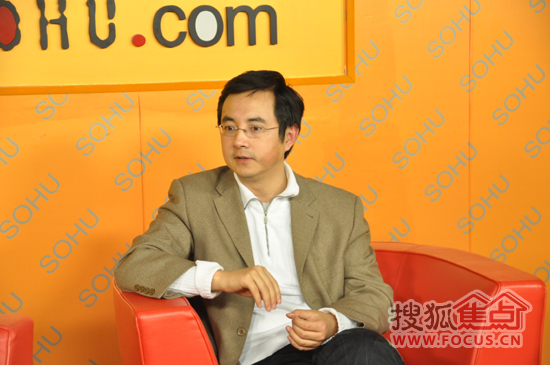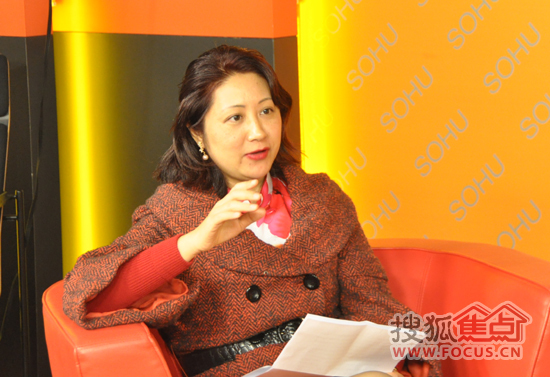Live: Anju· Feng Shui Forum - Feng Shui can also be very scientific
Anju·Feng Shui Forum site
Feng Shui has always been a topic of great concern to the public. It is a unique culture that has been circulated in China for a long time. It can be said to be closely related to people's lives. It is also a controversial topic. Sohu Home United "Easy Culture and Habitat The Environmental Design Research Professional Committee held the theme forum of “Anju·Feng Shuiâ€. In this forum, we invited two experts from the scientific community and Feng Shui to analyze how to use science to apply for Feng Shui.
  Location: Sohu Shanghai Studio
Guest: Xu Peng - Distinguished Professor of Tongji University, Consultant Professor of the Center for Green Building and New Energy Research, Ph.D., University of Colorado, USA, Scientist of Lawrence Berkeley National Laboratory, USA
Yao Rong - CEO of Shanghai Rongdao Architectural Design Co., Ltd., Chairman of the National Association of Industry and Commerce Real Estate Managers, "Design of Yi Culture and Habitat Environment Design", and Sohu.com Home Channel "An Feng Shui Design" Moderator
[Moderator]: Welcome two guests to be our guests. We have lived in Fengshui Forum. We have also done many feng shui related topics in the previous issues, feng shui and human settlements, feng shui and interior design, the relationship between Feng Shui and architecture, etc. . Today, we invited Professor Xu Peng from Tongji University. The topic we discussed today is “Feng Shui and Scienceâ€. The first question I would like to ask, Professor Xu is mainly engaged in the design of intelligent buildings. He is a research-oriented professor. I don't know why you are interested in the topic of Feng Shui.

Tongji University Distinguished Professor, Ph.D., Consultant Professor of Green Building and New Energy Research Center, Ph.D., University of Colorado, USA, Xu Peng, Scientist, Lawrence Berkeley National Laboratory, USA
[Xu Peng]: Like Chinese medicine, my attitude is to love and hate attitude. Chinese medicine has many methods. Feng Shui is the same. After thousands of years of tradition, there are many valuable things. These things are not combined with modern technology. It has improved and it has become a mixed bag. Feng Shui is a very good thing, but we stand up and talk unreasonably, lack some practical knowledge, there are things worthy of criticism, but there are things that we should keep to expand. For example, the simplest thing in Feng Shui is that the house faces south. From the perspective of energy saving and comfort, there is no doubt that we build a house and hope that your bedroom will always have sunshine in the winter. In the summer, avoid the day. Sun, then our house is slightly southerly facing the south to solve this problem, if the light from a scientific point of view, you can see this problem. But to go to the United States to build a house, not to pursue a south-facing house, in any direction, this is our essence, it is worth to carry forward. But now there are a lot of Mr. Feng Shui holding a compass to look at the house. Different feng shui masters tell you different things, and the result is a continuous decline in credibility.

CEO of Shanghai Rongdao Architectural Design Co., Ltd., Chairman of the National Federation of Industry and Commerce Real Estate Managers Association of "Easy Culture and Human Settlement Environment Design Research", and Sohu.com Home Channel "An Feng Shui Design" moderator Yao Rong
[Yao Rong]: I totally agree with Professor Xu that our feng shui has been popular for thousands of years and has been popular in many countries in Southeast Asia. But in fact, in general, it is characterized as a concept of theology, witchcraft. Although some countries in the world now regard feng shui as the basis of ecology, it is more of a theology. Because feng shui does not form a discipline, for example, Feng Shui often refers to the "qi", there is no specific data like the US LEED certification, so this is the reason why feng shui can not be placed on the countertop. But in fact some phenomena of feng shui can be confirmed, but there is no data to analyze it. Just like Chinese medicine, it was traditional Chinese medicine that used to treat diseases in ancient times. Its efficacy is unquestionable. Moreover, some Western countries cannot solve Western-style diseases, but Chinese medicine practitioners can be optimistic. As Xu said in some places, it is still characterized as witchcraft. This is the same phenomenon as Feng Shui. Its roots are Taoist. It is always a big conceptual thing. There is no specific one. The data to argue. Feng Shui has actually had some good things over the years. There are scientific things. If you can carry it forward, you still need scientists like Professor Xu to deepen it.
[Xu Peng]: Feng Shui inside the house can not be very closed, pay attention to ventilation, including the inability to have localized acupoints. As a scientific research, in the past 20 years, the world has done a lot of research on building physics. I think this problem is very simple. The indoor ventilation problem requires oxygen. There are some harmful substances in the air. Potassium cyanide is harmful, and there is some dust. Because it only needs a very low ventilation according to this, as long as 5 cubic meters of fresh air is enough. However, in the first energy crisis of the 1970s, this standard implemented a lot of problems. The architectural design has “inhabited insufficiencyâ€. There are many low-concentration things in the air, just like the carpet in this room. Some things that are harmful to the human body are distributed, but the concentration is very low, and it is not detected. This is actually a very limited method of science at that time, including today we can not clearly detect the smell of some of the nose, PPT has many gas instruments. I can't measure it, but the nose can feel that this place is wrong. For example, if there is air occlusion, but scientific analysis is not possible. This is a step ahead of us. Science has a big problem: it is easy to be arrogant. Feng Shui comes from the subjective feelings of people, but it is felt but not analyzed.
We often say that feng shui is a gas field. Light does not exist from a scientific point of view, because it is a subjective feeling of a person. You stand here with a gas field. What is the gas field? From a scientific point of view, there are only three fields in the world, one is the energy field, the other is the material field, and there is an information field. The same material energy, because the form is different, the information field will also Not the same, so the gas field is essentially the three together. We have a clear understanding of the material field, including the fact that the energy field affects the home to a large extent. The material field is the air-demanding substance, and the carbon dioxide concentration is too high. These can be measured. If the information field is not very A good way to organize it, in a nutshell, for example, a book, the same substance, these inks, the same level of energy, one that can be written as a book is very interesting, but can also be turned into stains on paper. Then you go to a room too. With the same Furniture, you can pile them up in a mess, or you can put them neatly. Like the shape outside the house, the same wall material, the same height, but because of the different forms, the subjective feelings of people are completely different, this has not been fully quantified, or even quantified means. I have done a lot of work on the material field and the energy field, so your topic is what can be analyzed in science. If it is big, science knows very little, just that the energy field and the material field know something. Things, the inside does not know.
[Yao Rong]: Professor Xu, can you tell some concrete examples, for example, the gas you just mentioned is actually divided into anger and anger, and anger can make people prosperous, and suffocating can make people take bad luck. Feng Shui is surrounded by how to avoid suffocating gas and form a lot of standards for Feng Shui. For example, the flow of gas in the gas field is like the flow of blood in the human body, just like keeping the blood flowing, so the house should choose the place where the air circulates. But what is the air circulation? What is the air that is not circulating?
[Xu Peng]: This is the experience that we humans have summed up for many years, but I didn't know why. For example, in the dead lane, most of it is stagnant water. The accumulated water will form a virus, and the bacteria will be released into the air. If it does not circulate, it will lead to infection. There is also a PM2.5 that is said so much now that it is a solid particle, but it is not. These small things, the surrounding environment is constantly emitting these things, no matter the dust of the ground, including the people themselves will also be distributed, the animals will also be distributed. Some of these things are solid, like particles, some are aerosols, some are liquids, and these things eventually gather in the dead lanes and cause illness. So you first feel that you are not quite right from your own nose, not as good as an open place, but you can't clearly know why.
Commercial Furniture,Commercial Office Furniture,Commercial Desk,Commercial Lounge Furniture
NINGBO CHEN WEI SUPPLY CHAIN MANAGEMENT CO.,LTD , https://www.chenweifurniture.com